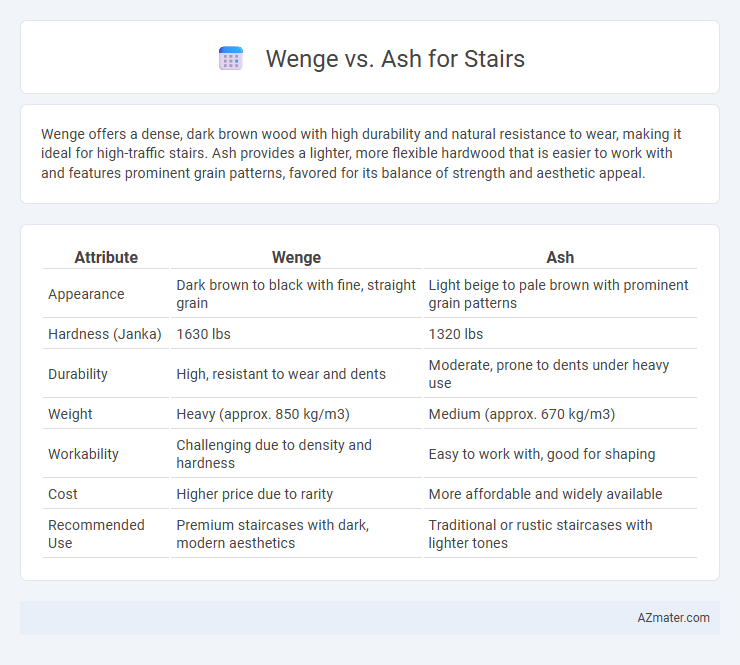Wenge offers a dense, dark brown wood with high durability and natural resistance to wear, making it ideal for high-traffic stairs. Ash provides a lighter, more flexible hardwood that is easier to work with and features prominent grain patterns, favored for its balance of strength and aesthetic appeal.
Table of Comparison
| Attribute | Wenge | Ash |
|---|---|---|
| Appearance | Dark brown to black with fine, straight grain | Light beige to pale brown with prominent grain patterns |
| Hardness (Janka) | 1630 lbs | 1320 lbs |
| Durability | High, resistant to wear and dents | Moderate, prone to dents under heavy use |
| Weight | Heavy (approx. 850 kg/m3) | Medium (approx. 670 kg/m3) |
| Workability | Challenging due to density and hardness | Easy to work with, good for shaping |
| Cost | Higher price due to rarity | More affordable and widely available |
| Recommended Use | Premium staircases with dark, modern aesthetics | Traditional or rustic staircases with lighter tones |
Introduction to Wenge and Ash as Stair Materials
Wenge is a dense, dark hardwood from Central Africa known for its rich chocolate brown color with subtle black streaks, offering exceptional durability and resistance for staircase applications. Ash, a lighter-toned hardwood native to North America and Europe, is prized for its strength, shock resistance, and attractive grain patterns, making it a popular choice for both traditional and modern stair designs. Both woods provide excellent stability and wear resistance, but Wenge's unique aesthetics and hardness make it suitable for high-traffic areas, while Ash offers a brighter, more versatile look with superior workability.
Visual Appearance: Wenge vs Ash
Wenge features a deep, rich brown color with dark chocolate undertones and a striking grain pattern that adds a luxurious and dramatic touch to staircases. Ash offers a lighter, creamy beige tone with a straight, pronounced grain, creating a bright and airy visual appeal that complements modern interiors. The contrasting aesthetics of Wenge's dark, bold character and Ash's light, natural warmth make each ideal for different design styles in staircase construction.
Durability and Hardness Comparison
Wenge wood boasts a Janka hardness rating of approximately 1630, offering exceptional durability and resistance to wear, making it ideal for high-traffic stairs. Ash ranks slightly lower with a Janka hardness around 1320, which provides good durability but is more prone to dents and scratches compared to wenge. The dense, oily nature of wenge contributes to its superior hardness and long-lasting performance on staircases, whereas ash's lighter color and moderate hardness suit environments with less intensive use.
Workability and Installation Considerations
Wenge wood is dense and hard, making it durable but challenging to work with due to its tendency to dull tools and difficulty in nailing or screwing without pre-drilling, which can slow down stair installation. Ash offers excellent workability, cutting, shaping, and fastening easily with standard tools, reducing labor time and complexity during stair assembly. For installation considerations, Ash's lower density ensures easier handling and faster fitment compared to Wenge, which requires specialized techniques to prevent splintering and maintain structural integrity.
Cost Differences: Wenge vs Ash
Wenge wood is significantly more expensive than ash due to its rarity and dense hardness, making it a premium choice for staircases. Ash offers a more budget-friendly option with moderate durability and appealing grain patterns, often preferred for cost-efficient stair projects. The price gap can range from 30% to 50%, influencing the overall cost of materials and installation for stair construction.
Maintenance and Care Requirements
Wenge wood requires regular dusting and occasional oil treatments to maintain its deep, rich color and prevent drying or cracking, while ash demands more frequent sealing to protect its lighter tone from stains and moisture damage. Both hardwoods benefit from avoiding excessive water and direct sunlight, but ash's open grain pattern makes it slightly more prone to dirt accumulation and surface wear. Proper maintenance of either wood type ensures long-lasting durability and aesthetic appeal for stair installations.
Environmental Impact and Sustainability
Wenge wood, sourced primarily from African rainforests, faces significant sustainability challenges due to overharvesting and habitat loss, making certified sustainable options critical to minimize environmental impact. Ash, commonly found in North America and Europe, is more abundant and faster-growing, allowing for more sustainable harvesting practices and lower carbon footprint during production. Choosing ash for stairs supports renewable forestry management and reduces pressure on endangered species compared to wenge, aligning with eco-friendly and sustainable construction goals.
Suitability for Modern vs Traditional Interiors
Wenge wood's deep, rich brown tones with subtle black streaks complement modern interiors, offering a sleek, sophisticated look ideal for minimalist stair designs. Ash wood features a lighter, creamy color with prominent grain patterns that enhance traditional interiors, providing a warm, classic appearance suitable for ornate staircases. Both woods offer durability, but Wenge's darker hue suits contemporary aesthetics, while Ash's brightness aligns with rustic or classic decor.
Pros and Cons of Wenge for Stairs
Wenge wood offers exceptional durability and resistance to wear, making it ideal for high-traffic stairs that require long-lasting strength. Its deep, rich dark brown color with unique grain patterns adds a luxurious and modern aesthetic to staircases but may darken over time under sunlight exposure. Despite its hardness, Wenge can be prone to splintering if not properly finished, and its high cost compared to ash wood might limit budget-conscious projects.
Pros and Cons of Ash for Stairs
Ash is a durable hardwood known for its strength and shock resistance, making it ideal for stair treads subject to heavy foot traffic. Its light color and prominent grain pattern offer a bright, natural aesthetic, but it can show dirt and wear more easily compared to darker woods like Wenge. However, Ash is more prone to dents and scratches due to its slightly softer density, requiring regular maintenance to keep stairs looking pristine.

Infographic: Wenge vs Ash for Stair
 azmater.com
azmater.com